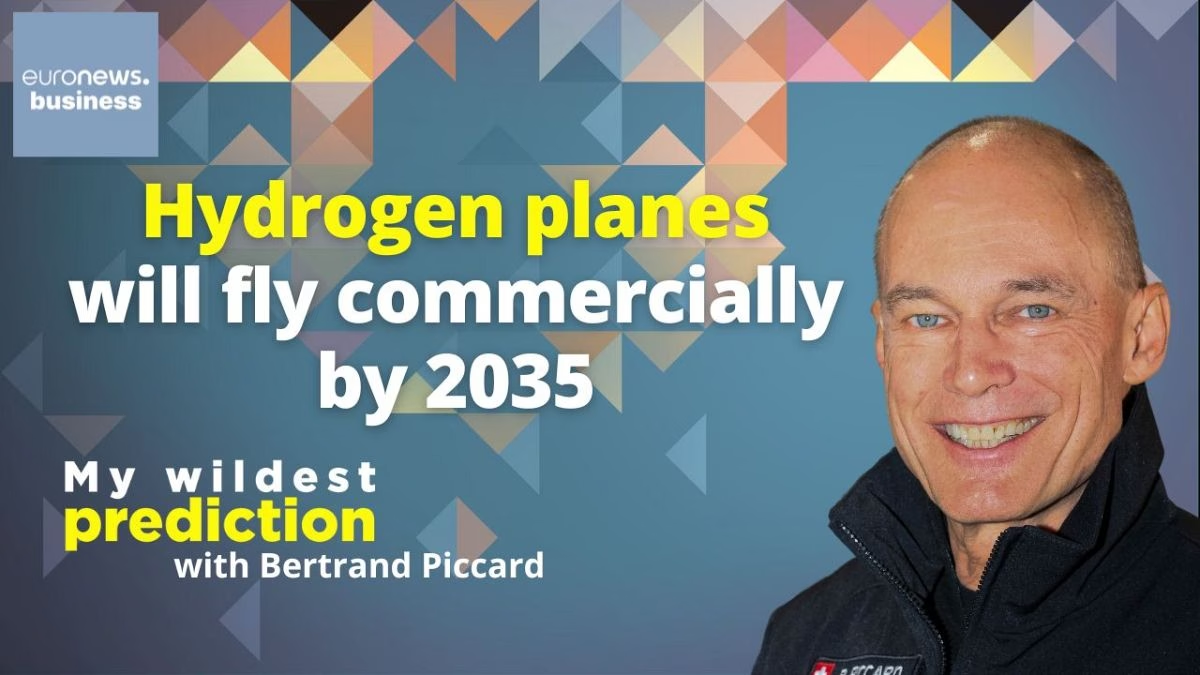Is it possible to transform aviation into a greener industry? According to global explorer Bertrand Piccard, the answer is undoubtedly yes. Through his ambitious project, Climate Impulse, Piccard is determined to achieve the first ever non-stop flight around the world powered by a green hydrogen airplane.
Dive into the “My Wildest Prediction” podcast series from Euronews Business where futurist Tom Goodwin converses with Bertrand Piccard, a Swiss psychiatrist, aviator, and renowned global explorer, about green hydrogen planes and the Climate Impulse initiative.
In 1999, Piccard, along with British pilot Brian Jones, made history by completing the first ever non-stop balloon ride around the globe. He then set another record in 2016, Circumnavigating the globe in a solar-electric airplane, alongside André Borschberg. These accomplishments underscored the potential of renewable energy sources in reducing the environmental footprint of aviation.
Building on his success, Piccard initiated Climate Impulse in 2024, partnering with fellow explorer Raphaël Dinelli. The mission: to develop the world’s first aircraft powered by green hydrogen capable of a non-stop global journey.
Bertrand Piccard joined My Wildest Prediction to share his vision and discuss this audacious venture.
Hydrogen’s Role in Future Mobility
“I foresee the debut of commercial flights carrying passengers in hydrogen-powered airplanes by 2035,” Piccard told Euronews Business. His forecast highlights the potential for innovative solutions to combat climate change.
Aviation currently contributes to 2.5% of global CO2 emissions from energy use, and these emissions are on the rise. Despite its environmental impact, the sector is vital to the European economy, providing employment for 1.4-2 million individuals and contributing over €110 billion to the European GDP.
Advocating for hydrogen, Piccard emphasizes its potential as a clean energy source. He is particularly interested in green hydrogen, which is produced from renewable sources and is free from carbon emissions.
“We must use the cleanest and purest form of hydrogen…it’s a new venture that must be built, a new industry requiring us to start from scratch,” Piccard asserted.
The demand for hydrogen reached 97 million tonnes in 2023, mainly for refining and chemical industries, with almost all of it derived from fossil fuels. The use of hydrogen in transportation is still in its nascent stages, with many questions yet to be answered.
Piccard remains optimistic about finding novel solutions to such challenges.
“Once individuals perceive a problem as just another challenge rather than an obstacle, interest and innovation follow,” Piccard pointed out.
He believes that it is the responsibility of innovators to demonstrate the feasibility of such projects, paving the way for industries to invest and bring the cost of new technologies down.
Embracing the Climate Impulse
Announced in February 2024, the Climate Impulse project aims to build the world’s first green hydrogen-powered airplane for a non-stop, zero-emission flight around the globe. The aircraft is being constructed in France, with Syesnqo as the principal technological partner, and additional support from the OCP Group in Morocco and the University Mohammed VI Polytechnic.
“There are significant challenges ahead, including keeping hydrogen in a liquid state at -253°C and ensuring all components, from the fuel cell to the electric motors, function harmoniously together,” explained Piccard.
The planned flight is set to depart in 2028 and is expected to last nine days.
Piccard is already considering new horizons for the project’s next adventurous leap.





